The BTSD team identified the challenge of addressing the role racial trauma plays in student mental health through a deep dive with a variety of school and community members including Bristol Cares Coalition, student, staff, and family surveys, and with their Equity Leadership Council. Student voice was emphasized in the process for identifying their challenge with specific student panel discussions.
One district leader shared “Our students have expressed a need to address racial trauma and growing mental health needs exacerbated by the pandemic. Students are impatient with the lack of action in our community. We heard students say, ‘We are exhausted. We keep discussing this and nothing changes.’” – BTSD District Leader
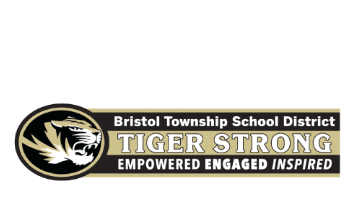
Mission Statement: “We are a District of motivated students and devoted teachers who are supported by dedicated parents, community, staff and administration. We prepare students for their future with state-of-the-art technology and innovative school programs combined with safe and engaging classrooms at all grade levels. Our belief in “Every Student, Every Day” provides students with the tools they need to be creative and empowered lifelong learners. Additionally, we strive for equity in education by fostering access and growth for all. We are honored to share our accomplishments on our website and will continue to pursue excellence.”
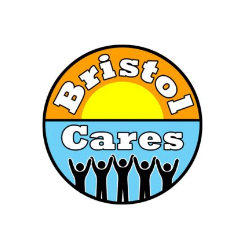
Mission Statement: “Bristol Cares is a prevention-based coalition developed to support positive youth development. Our mission is , “Creating a community where youth feel valued, have a vision for the future, a sense of self and community.”
Our service area is the Bristol Communities, which include our neighborhoods in Bristol Township and Bristol Borough. The coalition includes members of the community, school district and agencies with a shared vision for a safe, healthy, nurturing environment for all children and young adults.”
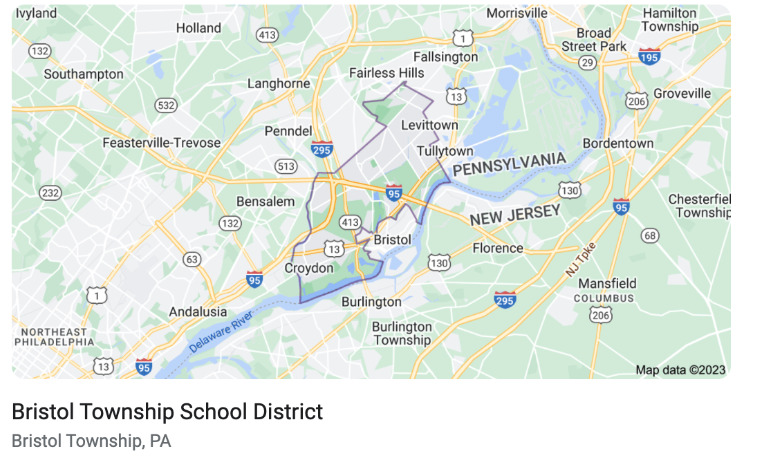
| Name | Role | Organization |
|---|---|---|
|
Christina Lorino |
Student |
BTSD |
|
Abigail Dubuisson |
Student |
BTSD |
|
Ilayda Akbayrak |
Student |
BTSD |
|
Malikah Upchurch |
Teacher |
BTSD |
|
Audrey Flojo |
Co-Lead |
BTSD |
|
Kathryn Jackson |
Teacher |
BTSD |
|
Damita Harris |
Co-Lead |
Bristol Cares |
|
Markisha Williams |
Community Member |
Parent |
|
Amy Coleman |
Instructional Leader |
BTSD |
| Name |
Christina Lorino |
|---|---|
| Role |
Student |
| Organization |
BTSD |
| Name |
Abigail Dubuisson |
| Role |
Student |
| Organization |
BTSD |
| Name |
Ilayda Akbayrak |
| Role |
Student |
| Organization |
BTSD |
| Name |
Malikah Upchurch |
| Role |
Teacher |
| Organization |
BTSD |
| Name |
Audrey Flojo |
| Role |
Co-Lead |
| Organization |
BTSD |
| Name |
Kathryn Jackson |
| Role |
Teacher |
| Organization |
BTSD |
| Name |
Damita Harris |
| Role |
Co-Lead |
| Organization |
Bristol Cares |
| Name |
Markisha Williams |
| Role |
Community Member |
| Organization |
Parent |
| Name |
Amy Coleman |
| Role |
Instructional Leader |
| Organization |
BTSD |
Employing the Inclusive Innovation process, the co-leaders established a team of district leaders, students, teachers, parents, community members, and school board members to deeply investigate their challenge topic through root cause analysis, user personas, and focus groups with a broad set of school and community members. The team analyzed data to define the priority problem and identified a central challenge to focus on in solution design: “Racial trauma impacting the mental health of students.” With support from the Center for Inclusive Innovation, the team conducted a literature review, data collection, and focus groups to develop indicators and outcomes for potential solutions.
After completing their initial research, the team ideated solutions ideas, prioritized ideas and components, iterated on and refined solutions ideas over multiple co-design sessions. The team then worked with a mental health expert to develop a solution concept and, again, engaged additional stakeholders and subject matter experts. Finally, the teams in Bristol Township have implemented solution prototype, gathered data for iteration, and initiated plans for refinement, additional implementation, sustainability, and eventual scale
To engage in building that future, the team built a community charter with equity commitments to ensure the team stayed true to their values. These included:
After building their vision and their agreements, the team was ready to begin their research.
Additionally, the team reviewed quantitative data from the school climate and culture surveys. The team then analyzed the community input, articulated the problem statement, and identified target outcomes to address the challenge.
The Bristol Township School District community of students, staff, and parents need intentional opportunities to discuss, learn about, share and address issues surrounding race in order to better support the mental health of students negatively impacted by experiences and normalization of racism and the lack of its acknowledgement.
After narrowing down to these ideas, the team hosted six focus groups with over 46 participants. In each focus group, participants discussed the four options and gave feedback on each idea. At the end, participants were asked to vote on their top idea. These focus groups informed their top solution, Student-Led Professional Development for Educators.
Student-led professional development for educators on mental health and racial trauma, supported by community mentors. The team will create professional development opportunities for teachers led by students that include sharing personal experiences with racism in schools and its impact on their mental health. These training sessions will be informed by best practices, research, and professional expertise. The training should include scenarios for role playing as well as resources on how to respond. It will include a focus on cultural pride and affirmation of cultural identities of families through the curriculum. Below is a graphic that describes the multiple layers of the BTSD Student-Led PD Solution.
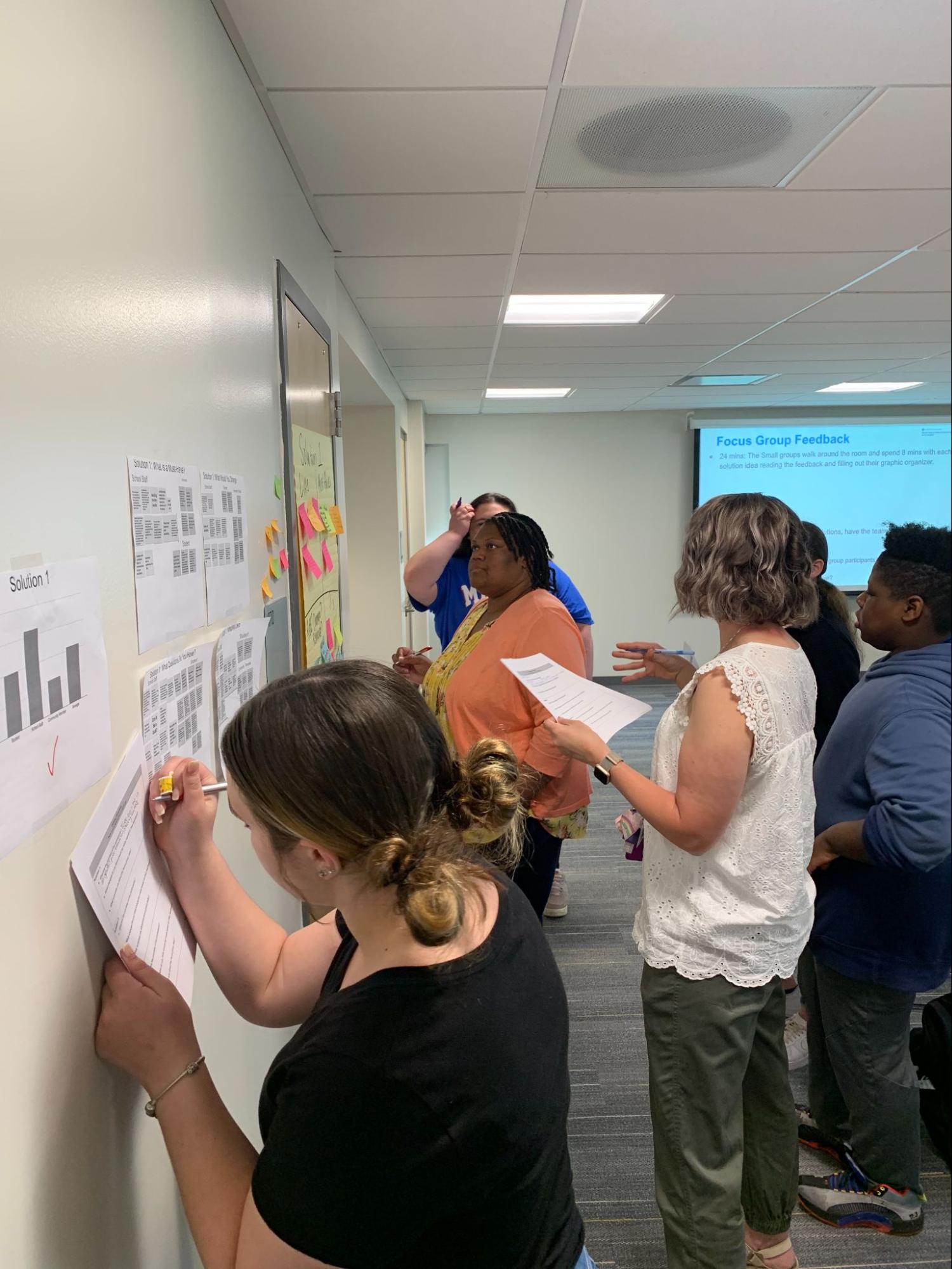
BTSD students and district staff work together to analyze focus group data.
As we all know, students are increasingly battling with racism and systemic oppression inside and outside of school. This mentor program gave students the support to understand their relationship with humility, self-awareness, and the importance of advocating for themselves. This program has shown me the importance of mentoring the lives of the youth, especially the ones who’ve experienced trauma. – BTSD Mentor
The training included opportunities for self-reflection and healing and prepared students to facilitate conversations with teachers about the impact racism has on student mental health. Students were also partnered with the community members, who were familiar with mental health supports, to support them throughout the work.These community partners completed mentor training prior to working with students. Finally, the students co-designed and facilitated teacher training, making changes with each iteration to improve their facilitation. Supported by community mentors and a subject matter expert, as well as Digital Promise team members, the students presented the prototype workshop to educators in December 2022; the training sessions continued in Spring 2023 with additional educators, and a third session took place in May 2023.
In order for students to feel prepared to lead professional development for teachers focused on the impact of racial trauma on student mental health, the students went through a semester of training that supported them in discussing their own mental health and the impacts of racial trauma. Through this process, students had support from a mental health professional and community mentors who reflected their identity. Through the training materials they also learned how to share about their experiences and support teachers in action planning. Below are the samples of materials that were used in the experience. Before implementing any of these materials, educators need to be fully prepared with professional support to implement the materials safely.
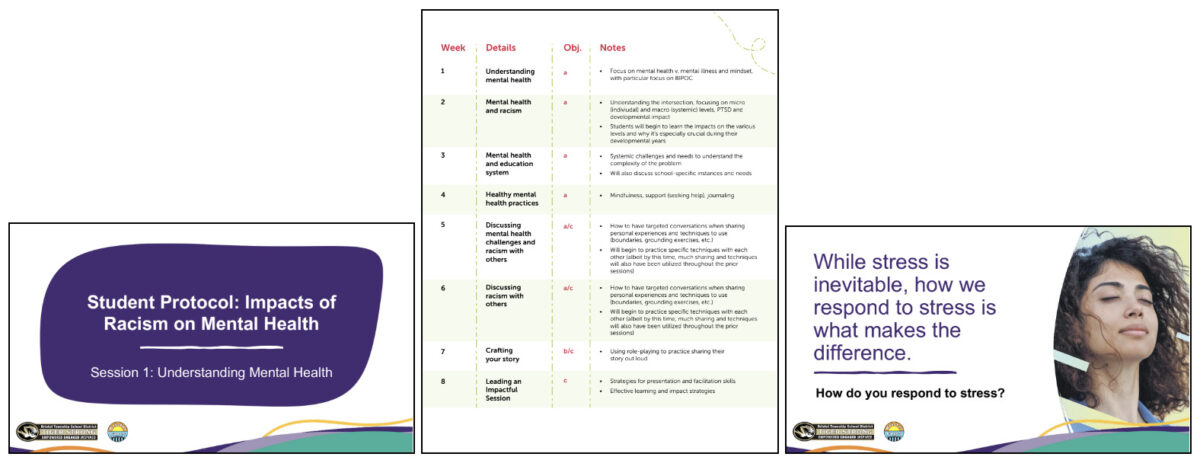
| Student Training Outline | Student Training 1 Deck | Student Training 2 Deck | Student Training 3 Deck | Student Training 4 Deck |
|---|---|---|---|---|
|
This document provides an overview of the 8-part training students experienced |
The initial training provided an introduction to mental health |
The second training focused on the relationship between racism and mental health |
The third training explored the ways in which educational settings and experiences impact mental health |
The fourth training provided an overview of positive mental health practices |
| Student Training Outline |
This document provides an overview of the 8-part training students experienced |
|---|---|
| Student Training 1 Deck |
The initial training provided an introduction to mental health |
| Student Training 2 Deck |
The second training focused on the relationship between racism and mental health |
| Student Training 3 Deck |
The third training explored the ways in which educational settings and experiences impact mental health |
| Student Training 4 Deck |
The fourth training provided an overview of positive mental health practices |
The community mentors were supported through training and debriefing. The training included information about mental health first aid, racial trauma, and students support systems. Below are a selection of resources.
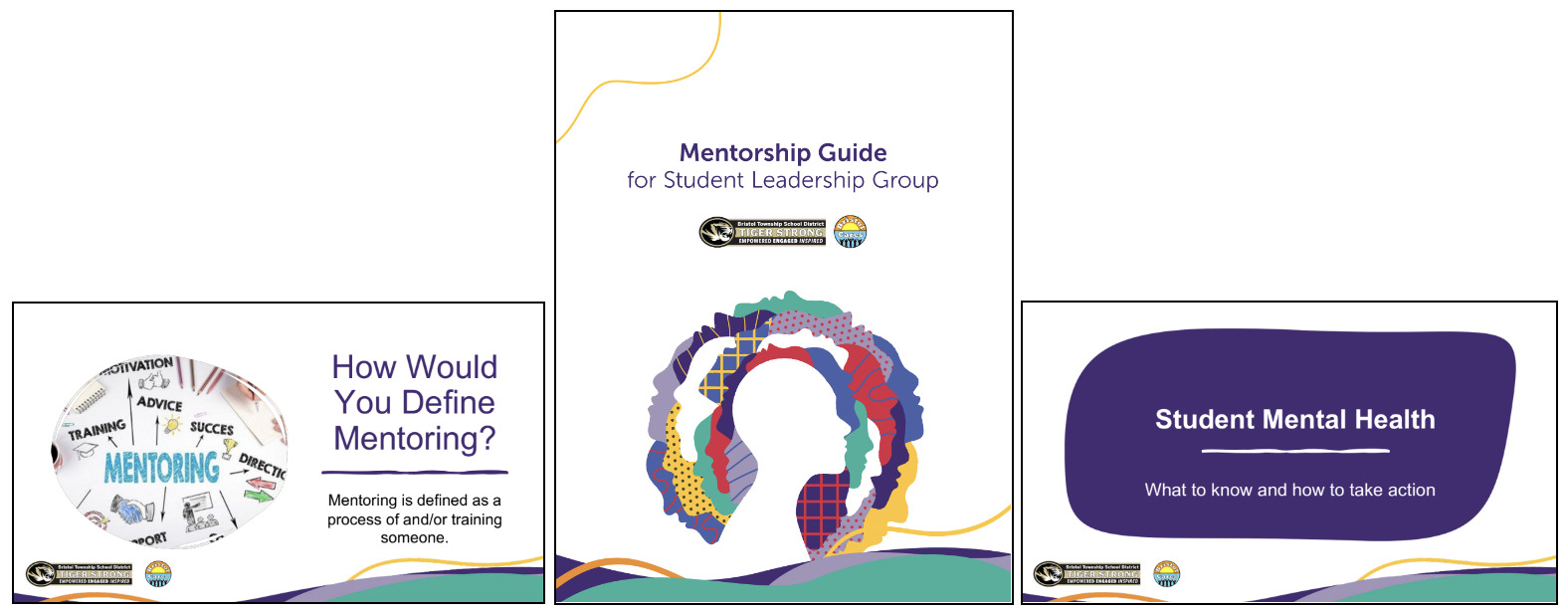
| Mentorship Training | Mentorship Guide | Mentorship Mini Mental Health First Aid Training |
|---|---|---|
|
This training prepared mentors to support students in discussing mental health and racial trauma. |
This resource offers guidance on creating a mentorship program to support student learning and advocacy. |
This mini mental health first aid training covers mental health challenges, warning signs, and how to respond. |
| Mentorship Training |
This training prepared mentors to support students in discussing mental health and racial trauma. |
|---|---|
| Mentorship Guide |
This resource offers guidance on creating a mentorship program to support student learning and advocacy. |
| Mentorship Mini Mental Health First Aid Training |
This mini mental health first aid training covers mental health challenges, warning signs, and how to respond. |
This program provided an opportunity for our youth to find their voice and share their stories related to how they can be marginalized but also empowered to be that voice for those who are still in middle school. As a mentor I was excited to see the growth and confidence in the youth especially as they successfully delivered the PD for their teachers and administrators. – BTSD Mentor
Student-Led Professional Development
The final component of the solution included students presenting their learnings to teachers. At each session, teachers learned about the connections between experiences of racism and mental health. Students shared personal stories about their experiences in school. Each session concluded with teachers developing action plans for confronting racism and supporting students’ mental health.
Beyond the project’s end, the community district team continued to offer the student-led professional development and are planning on continuing the Student Leadership Team during the coming school year. There are also plans to continue to offer the student-led professional development for teachers starting at the beginning of the coming school year.
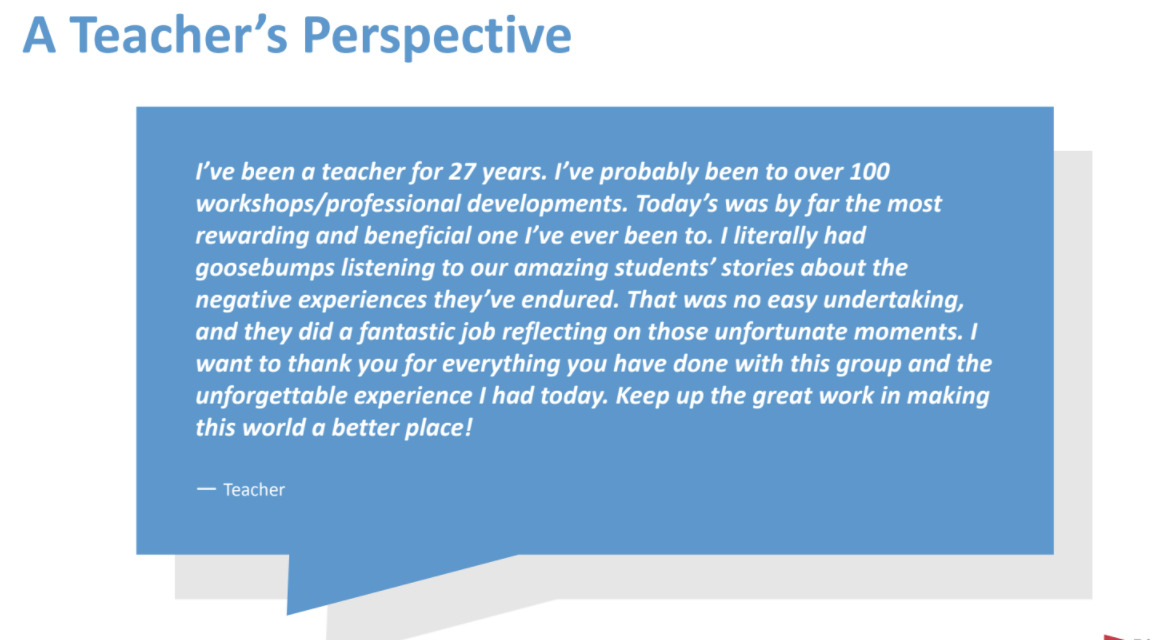
(0% rated it poorly)